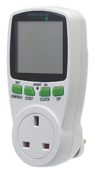There are two main types of fridge/freezer, one uses a capacitor start single phase motor, the other a three phase motor powered by an inverter, the latter should be no problem, it has very little in rush, the highest load is normally when the auto defrost cuts in that will be around 150 watt, normal running as
@jj4091 says around 60 - 90 watts.
However the single phase motor has inrush so start current is more like 5 amp, or 1000 watt, when running still 60 - 90 watts, but takes a lot more to start, I used a plug in energy meter to see the peak power. And the peak power varies a lot make to make.
To get around the inrush there are three options:-
1) Inverter controlled fridge.
2) Peltier solid state.
3) Absorption.
The latter two are not very economic to run, most caravan fridges are absorption and can run on 12 volt, 230 volt or gas, some times on 12 volt not regulated.
You can get dc motors, but the problem with any refrigeration plant is to get motor to running speed before the gas pressure builds up, so always a bit of a trade off. I would think likely a 750 watt inverter is about the smallest that will work, with an ability to cope with some overload for short time, I had a 3 kW running and 6 kW peak inverter most seem to be duel rated.
I looked at battery back up, but in the end went for combined solar array with battery and a back up system included. Not sure how long it will run freezers for, but should be long enough to arrange some other power.


